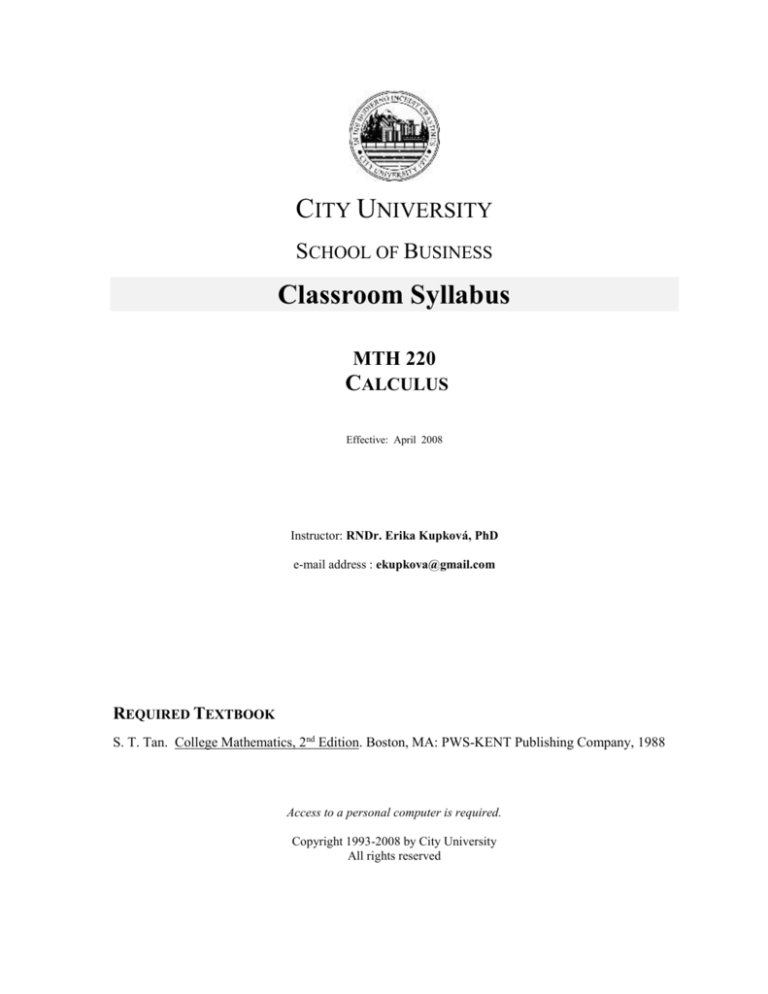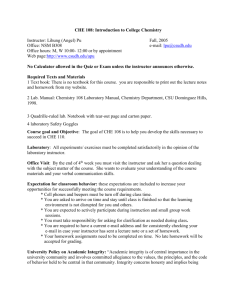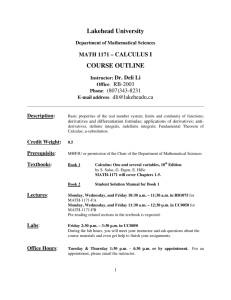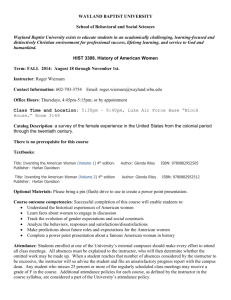
CITY UNIVERSITY
SCHOOL OF BUSINESS
Classroom Syllabus
MTH 220
CALCULUS
Effective: April 2008
Instructor: RNDr. Erika Kupková, PhD
e-mail address : ekupkova@gmail.com
REQUIRED TEXTBOOK
S. T. Tan. College Mathematics, 2nd Edition. Boston, MA: PWS-KENT Publishing Company, 1988
Access to a personal computer is required.
Copyright 1993-2008 by City University
All rights reserved
MTH 220 - CALCULUS
This document provides an overview of the course foundation elements, assignments, schedules and
activities. For information about general City University policies, please see the City University
catalog. If you have additional questions about the course, please contact your instructor.
COURSE DESCRIPTION :
This course covers the basic concepts and theory of differential and integral calculus of one variable,
with emphasis on applications to business and economics. Additional applications are drawn from the
natural and social sciences. Strongly recommended: College Algebra and/or Precalculus.
LEARNING OBJECTIVES :
Upon the successful completion of this course, you will be able to:
1. Calculate limits for elementary functions and their combinations;
2. Solve differentiability at a point for a function by determining where it is continuous or
discontinuous (and type of discontinuity);
3. Solve differentiability at a point for a function by determining where it is differentiable using the
basic derivative theorems and results;
4. Solve function derivatives using product, quotient, and chain rules;
5. Develop tangent line equations for functions;
6. Solve first and second derivatives;
7. Solve related problems using implicit differentiation;
8. Graph functions;
9. Use marginal functions in economics;
10. Find antiderivatives, indefinite integral and definite integral of functions.
11. Solve areas under a curve.
CORE CONCEPTS
To achieve the goals of this course, you will need to master the following core concepts:
1. Functions, Graphs, and Models;
2. Differentiation;
3. Exponents and Logarithmic Functions;
4. Integration;
RECOMMENDED SUPPLEMENTARY RESOURCES :
Orr, Bill. HarperCollins College Outline: College Algebra. New York: HarperCollins, 1992.
www.cutn.sk
http://mss.math.vanderbilt.edu/~pscrooke/toolkit.shtml
http://mathworld.wolfram.com/
www.math.com
2
OVERVIEW OF COURSE ACTIVITIES AND GRADING :
The grade you receive for the course will be derived using City University’s decimal grading system,
based on the following:
Assignment
Precalculus Review Quiz
20%
2 HW Review Quizzes (10% each)
20%
Midterm Exam
25%
Final Exam
30%
Activity
5%
TOTAL
100%
EXPLANATION OF ASSIGNMENTS AND GRADING :
PRECALCULUS REVIEW QUIZ
The quiz will cover first two weeks of the course. Short typical problems will be included. In the case
of very short problem only the result will be graded. Good grade is needed if a student wants to
understand the material of weeks 3-10. Students can use their own formulas list.
2 HW REVIEW QUIZZES
Each quiz will consist of homework assignments from the previous 3-4 classes.
MIDTERM EXAMINATION
The exam will cover material of the first half of the course. A review class will be given before
taking the midterm. Students can use their own formulas list and will be supposed to work out 4-7
concrete problems. No theoretical questions will be included.
FINAL EXAMINATION
The final exam will cover only second part of the course. It will consist of typical practical problems
that were explained during the course. A review class will be given before taking the final. Students
can use their own formulas list and will be supposed to work out 4-7 concrete problems. No
theoretical questions will be included.
ACTIVITY
Activity involves your participation at in-class problem solving situations. You are supposed to bring
a scientific calculator to each class. The recommended type of calculator is CASIO with 2-line
display and multi-replay function (fx-350MS has both these required properties).
Activity – 5 points altogether
Demonstrating a solution of a problem at the board - a problematic one from HW, or any problem
during the lesson (easy problem = 1 point, more complex problem = 2 points).
Attending and solving an in class experiment (3 points)
IMPORTANT NOTE:
After completing all mentioned assignments student will not get any additional work in order to
increase the grade.
SCHOLASTIC HONESTY:
3
City University expects each student to do his/her own work. The University has "zero tolerance" for
cheating, plagiarism, unauthorized collaboration on assignments and papers, using "notes" during
exams, submitting someone else's work as one's own, submitting work previously submitted for
another course, or facilitating acts of academic dishonesty by others. The penalties are severe! A
first offense can result in a zero grade for the course and suspension from the University for a quarter;
a second offense can result in a zero grade for the course and suspension from the University for a
year; a third offense can result in expulsion from the University. The Policy and Procedures may be
found at www.cutn.sk/SH
In addition to providing your work to the instructor for grading, you must also submit an electronic
copy for the City University archives (unless the work is specifically exempted by the instructor).
You will not receive a final grade until and unless you submit this electronic copy. The procedure for
submitting work to the archives is to upload it via the website www.cutn.sk/Upload. Files should
include the cover page of the work with the student name, instructor name, course name and number,
and date. File names should indicate the type assignment, such as “researchpaper.doc” or
“casestudy.doc” (student name should not be a part of the file name because the system adds it). All
files received into the archives are submitted to www.TurnItIn.com for plagiarism checking.
RECOMMENDED COURSE SCHEDULE
The following schedule has been provided as a general guide to the course. Your instructor may elect
to adjust the outline to meet the unique needs of the class.
WEEK
TOPICS
READINGS
1
Precalculus Review – Part I
Ch. 1.2,9.1-9.3
2
Precalculus Review – Part II
Ch. 9.4-9.7
3
The Derivative – Part I
Ch. 10.1-10.2
4
The Derivative – Part II
Ch. 10.4-5
5
Differentiation – Part I
Ch. 11.1-2
6
Midterm, Differentiation – Part II
Ch. 11.3- 11.5
7
Applications of Derivative – Part I
Ch. 12.1-12.3
8
Applications of Derivative – Part II
Ch. 12.5,12.6
9
Applications of Derivative – Part III
Ch. 12.7
10
Review, Final examination
ASSIGNMENTS SCHEDULE:
Precalculus Review Quiz
HW Review Quiz 1
Midterm
HW Review Quiz 2
Final Exam
Week 2, April 10
Week 4, April 24
Week 6, May 6
Week 8, May 22
Week 10, Jun 3
4
STUDENT CAN MAKE UP THE MIDTERM EXAMINATION ONLY IN THE CASE OF UNEXPECTED
OR SERIOUS CIRCUMSTANCES WITH CONDITION THAT HE/SHE HAS INFORMED THE
INSTRUCTOR PERSONALLY, BY E-MAIL OR PHONE IN ADVANCE!
NOT BE ACCEPTED !!!
5
LATER EXCUSES WILL








